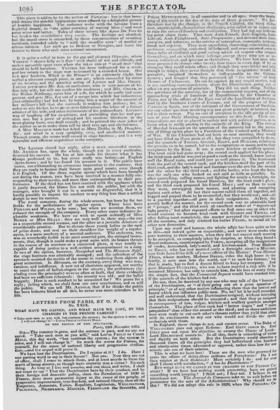The Lyceum closed last night, after a most successful season.
Mr. ARNOLD has, upon the whole, though not in every particular, deserved his success. He has at last made his theatre what it has always professed to be, but never really was before—an English e/pera-house ; and he has found his account in it. The public have eiown, notwithstanding an erroneous impression to the contrary, that they are ready to bestow their favour upon good music, even though it is English. Of the three regular operas which have been brought out during the season, two hive been received in a manner fully cor- responding to their merits, and more than corresponding to their per- formance. If the third has not been received with the applause which it justly deserved, the blame lies not with the public, but with the manager, who brought it out in a manner so disgraceful, that it is hardly possible to impute his conduct to any thing less than a settled design to mar its success. The vocal company, during the whole season, has been by far too feeble for the performance of regular opera. There have been PHILLIPS and WILSON, to be sure ; but when we mention them, we exhaust the strength of the company. Every other name indicates de- plorable weakness. We have no wish to speak unkindly of Miss Roam. or Miss Herter : they are very well in their way—the one as a respectable second woman, and the other as a juvenile debutante of considerable promise. But to elevate these young ladies to the rank of prime donne, and rest on their shoulders the weight of a regular opera, is a mere mockery of a musical audience. The orchestra, too, was so wretchedly feeble in its most essertial part, the stringed instru- ments, that, though it could make a great noise with its brazen throats in the course of an overture or a concerted piece, it was totally in- capable of doing justice to a well-written accompaniment to a song. In two of the operas, however, Noinjahad and The Mountain Sylph, the stage business was admirably managed ; and the splendour of the spectacle assisted the merits of the music in rendering them objects of great attraction. In Hermann, on the contrary, every thing was men, careless, and indifferent. A new set of choristers appeared, not worthy to enact the part of ballad-singers in the streets ; the performers (in- cluding even the principals) were so often at fault, that there evidently had been no sufficient rehearsals : the scenery was old ; and the ballet beggarly. How is such conduct to be accounted for ? We pause for a reply; failing which, we shall form our own conclusions, and so will the public. We can tell Mr. ARNOLD, that if he thinks the public has been hitherto blind to all this, he never was more mistaken in his life.




















 Previous page
Previous page